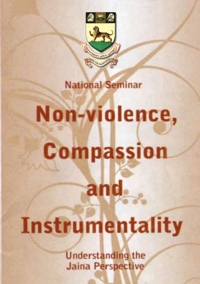 | Non-violence, Compassion and InstrumentalityA Jaina PerspectiveSeminar organized by the Department of Jainology of the University of Madras, 13 and 14 February 2009 Chennai, India |
14.02.2009
2.08 Compassion: Meaning, Purpose and Practices
Compassion is the noblest manifestation of humaneness. It is the merciful, sympathetic feeling and pity for the sufferings or distress of another, with the innate desire to help or save. All religions of the world emphasize the importance of compassion. It is an important aspect of human nature, part of the human mind. It is one of the good qualities of a human being. The various religions are trying to promote or strengthen that basic human quality which is already there. Compassion combined with wisdom and effective method of service becomes something fuller.
Lord Mahāvīra says, “One must be most compassionate and friendly towards all living beings.” Ācārya Kunda Kunda, said that anyone who feels the pain and misery of others like those suffering due to hunger, thirst, and other maladies, and acts favorably in order to mitigate their misery is said to be compassionate.
Tisidam bubhukkhidam va duhidam datt
huna jo du duhidamanao
Padivajjadi tam kivaya tassesa hodi anukampa
Another definition of compassion described it as “friendliness towards all the living beings.”
“Sarvapranisu Maitri anukampa!
Tattvārthavartika 1, 2, 30
The Tattvārtha Bhasya by Siddhasena Gani defines compassion as the feeling of a well-meaning, charitable and merciful person by which he identifies with the others in pain, and who treats their misery as his own and acts in a manner so as to mitigate their pain and misery. According to the Yoga Sastra, “Compassion is nothing but a strong desire to relieve and mitigate the pain and misery of the other without favor.
Anukampa dukhitesu apaksapatena
duhkhaprahaneceha!
Yogashastra, Svopajñā Vivarana 2, 15.Compassion is the feeling of identification with the miserable and the mentality and activity to relieve their pain and misery. However the term also includes action according to one’s capacity, to relieve their pain and misery. Compassion includes both - compassionate thoughts and mitigating actions. The compassion which you feel for those who are suffering will in itself bring them peace; and it will expand your hearts as well. We need to feel empathy with those who suffer. The deeper the well is the more water it can hold. Only compassion will cause the well-spring of the soul to issue forth. That supreme principle awakens in us due to our compassion.
Compassion has been variously hailed as a liberating force for the dispenser and as a mitigating force for the receiver.
The quality of mercy is twice blessed;
it blesses him that gives and him that takes
William ShakespeareWe cannot create suffering for ourselves without creating suffering for others, nor can we create suffering for others without creating suffering for ourselves. So the model of perfection for the highest development of the human being is someone who has reached complete ending of suffering himself or herself, and therefore will never create suffering for others.
Compassion is a feeling of equality rather than that of a superior person looking at an inferior person. Man has three weaknesses - cruelty, inequality, intolerance. There are three ways to rectify these - compassion, equality, control of strong emotions. In other words:
Let cruelty die and compassion awake!
Let inequality give way to equality!
Let frenzy cease and tolerance flower!
Let these lead towards “inner harmony!
Lord Mahāvīra laid down the scheme of the soul’s liberation from the mundane existence in the form of following a three way path comprising
- Right Vision (Samyag Darśana)
- Right Knowledge (Samyag Jñāna)
- Right Conduct (Samyag Caritra)
Out of these three, he put most emphasis on the first constituent of the liberating path - Samyag Darśana or right vision. The concept of compassion is inseparably linked with the very first and the most important ingredient of the liberating path - right vision.
Compassion and Spiritual Emancipation
Compassion is the core and crux of auspiciousness. The Jaina scriptures have vexed themselves eloquent in eulogizing auspicious thoughts and actions and in condemning the inauspicious ones. Auspicious thought currents and activities are regarded as spiritually meritorious (Puṇya Karma). The soul whose psyche is imbued with the thoughts of compassion attracts the auspicious karma-matter towards itself, and the one who torments others attract the inauspicious or sinful karma-matter. Service to the diseased and being ever ready to help the helpless are true obedience to the Jina teachings. The scriptures have always encouraged the followers and exhorted them to be compassionate and charitable. They have variously stressed the goodness of compassion, mercy, humility, charity and contentment.
Mother Teresa illustrates compassion at its best. She is one of those rare souls who have transcended all barriers of race, religion, creed and nation. The loneliest and the most wretched, the dying destitute, the abandoned lepers, have been received by her and her sisters with warm compassion devoid of condescension based on her reverence for God in man …
In her eyes the person who, in the accepted sense, is the recipient, is also the giver and the one who gives the most. Giving - giving, something of oneself - is what confers real joy, and the person who is allowed to give is the one who receives the most precious gift.
Mahatma Gandhiji’s compassion for the “poor suppressed, oppressed, downtrodden” classes whom he named “Daridra Narayans” or “Harijans” and the various projects he took to uplift them were dedicated to the removal of Peeda Paraayi (the pain of others). We can cite many examples of noble, compassionate souls who dedicated themselves to selfless service to the most deprived people.
Let us campaign for compassion for all living creatures with humanism in spirit and action.
To quote the famous English Poet William Blake:
He prayeth best who loveth best.
All things great and small.
Because the dear God who made us all.
He made and loveth us all.The above lines apply for all times and all creations. Compassion is the steppingstone towards higher spiritual achievements and it is the noblest form of selfless service.
References
1. Bhavan’s Journal, Aug. 15th, 2008 Vol. 55 No.12. Sri Mata Amritananda Mayi Devi, Eternal Wisdom - Upadeshamritam - Part
3. Goleman, Daniel (Ed): Healing Emotions - Conversations with the Dalai Lama on Mindfulness, Emotions and Health
4. Baya ‘sreyas’, Dr. (Col.) D.S.: Jainism - The Creed For All Times
5. Jain, Prof. Sagarmal: Peace, Religious Harmony and Solution to World Problems from Jaina Perspective
6. Acharya Tulsi: The Vision of New Society
7. Acharya Mahaprajna (R.H. Seth - Ed.) Towards Inner Harmony
8. Jain, Dulichand: Universal Message of Lord Mahavira

 Sasilekha Sunil
Sasilekha Sunil